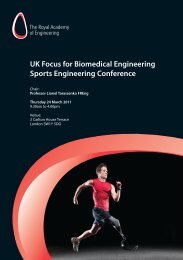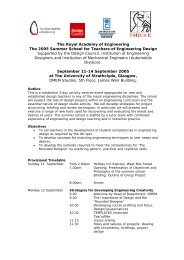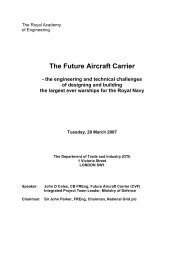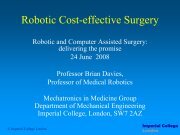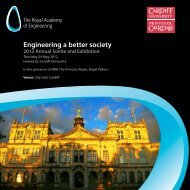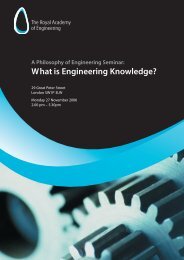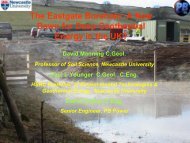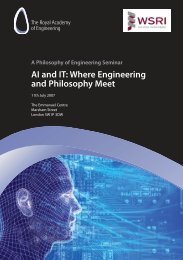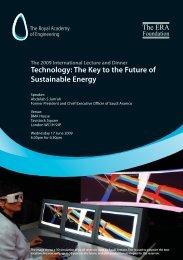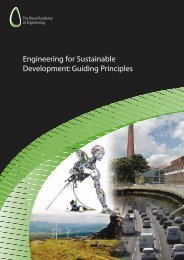Engineering graduates for industry - Royal Academy of Engineering
Engineering graduates for industry - Royal Academy of Engineering
Engineering graduates for industry - Royal Academy of Engineering
You also want an ePaper? Increase the reach of your titles
YUMPU automatically turns print PDFs into web optimized ePapers that Google loves.
Resources matter<br />
New teaching methodologies require appropriate learning spaces, equipment and<br />
supporting technologies<br />
●<br />
●<br />
●<br />
Group work and project-based learning need flexible rooms; hands-on<br />
experiences require traditional laboratories or more contemporary work spaces;<br />
students need access to up-to-date equipment and supporting technologies.<br />
Delivery <strong>of</strong> experience-led courses will incur additional cost <strong>for</strong> appropriate<br />
resources.<br />
Collaborative activities and facilities shared between universities or with <strong>industry</strong> make efficient use <strong>of</strong> resources.<br />
Financial sustainability<br />
● The introduction <strong>of</strong> experience-led components into engineering degrees will require start-up funding. Even without<br />
the enhancements required to deliver the recommendation made by Lord Sainsbury <strong>of</strong> Turville, funding <strong>of</strong> engineering<br />
degree programmes already falls short <strong>of</strong> what is needed by a mean <strong>of</strong> 15% among the case study universities.<br />
This represents a significant challenge to financial sustainability <strong>for</strong> university engineering departments, exacerbated<br />
by the current economic climate.<br />
●<br />
Enablers<br />
Funding required falls into two key categories: start-up or capital funding (new facilities, equipment) and recurrent or<br />
project costs (academic staffing, <strong>industry</strong> input, other staffing including administration, travel, materials, consumables<br />
and so on).<br />
● While the need <strong>for</strong> additional funding to deliver experience-led engineering degrees is undeniable, further consideration<br />
<strong>of</strong> funding sources and potential efficiencies is required. Possibilities include increased <strong>industry</strong> input, changing priorities<br />
at university level, knowledge and facility sharing among institutions and targeted government funding.<br />
Recommendations<br />
The three recommendations are given below. The RAEng and Higher Education <strong>Academy</strong> <strong>Engineering</strong> Subject Centre are<br />
committed to supporting <strong>industry</strong>, pr<strong>of</strong>essional bodies, university engineering departments and government in<br />
implementing these recommendations and to disseminating the effective practice highlighted in this report.<br />
Recommendation 1<br />
Experience counts and relevance motivates. Experience-led components must be embedded into every engineering<br />
degree, using the effective practice outlined in these case studies as inspiration. Experience-led engineering degrees<br />
benefit students and <strong>industry</strong> alike, supporting economic recovery and future prosperity.<br />
Outcomes Mechanism Actioned by<br />
●<br />
●<br />
●<br />
●<br />
●<br />
●<br />
Shared facilities<br />
Contemporary work spaces<br />
Flexible spaces<br />
Laboratories<br />
Up-to-date equipment<br />
Supporting technologies<br />
Leadership and commitment to deliver<br />
<strong>graduates</strong> with the required skills<br />
The right staff with the right vision and attitude<br />
More staff with up-to-date experience <strong>of</strong><br />
<strong>industry</strong><br />
Enhancement <strong>of</strong> the student experience<br />
Incorporate proposed changes into business<br />
plans including learning space design,<br />
equipment, technologies and finances<br />
Provide discipline-based support <strong>for</strong> learning<br />
and teaching and reward <strong>for</strong> excellent teaching<br />
Develop, support and encourage use <strong>of</strong><br />
mechanisms that enable academics to gain<br />
insights into <strong>industry</strong><br />
Increase opportunities <strong>for</strong> academics and their<br />
students to gain experience <strong>of</strong> <strong>industry</strong><br />
Universities<br />
University engineering<br />
departments<br />
Industry<br />
Universities have the capacity to develop<br />
flexible approaches to experience-led degrees<br />
Provide funding mechanisms that enable<br />
universities to use available funds more<br />
effectively and to focus on the delivery <strong>of</strong><br />
experience-led engineering degree programmes<br />
Government / the<br />
Funding Councils<br />
Active dissemination <strong>of</strong> effective practice and<br />
pr<strong>of</strong>essional support to implement change<br />
Continue to fund the Higher Education<br />
<strong>Academy</strong> <strong>Engineering</strong> Subject Centre<br />
Wider adoption <strong>of</strong> experience-led engineering<br />
degrees by HE<br />
Ensure that degree accreditation requires<br />
experience-led components<br />
Pr<strong>of</strong>essional bodies<br />
4 The <strong>Royal</strong> <strong>Academy</strong> <strong>of</strong> <strong>Engineering</strong>





